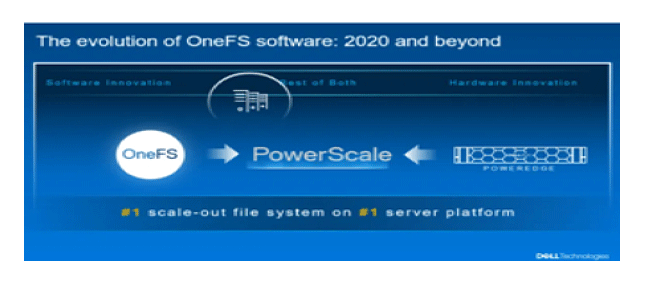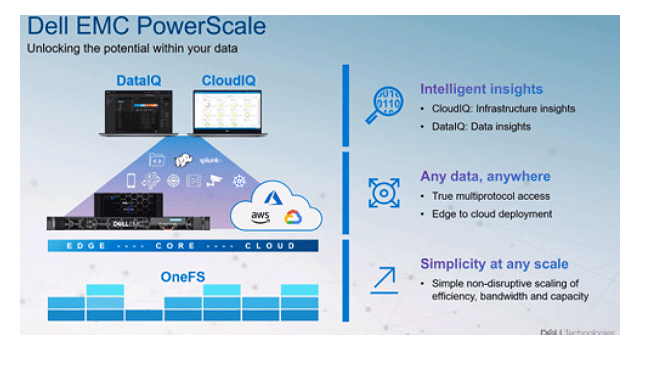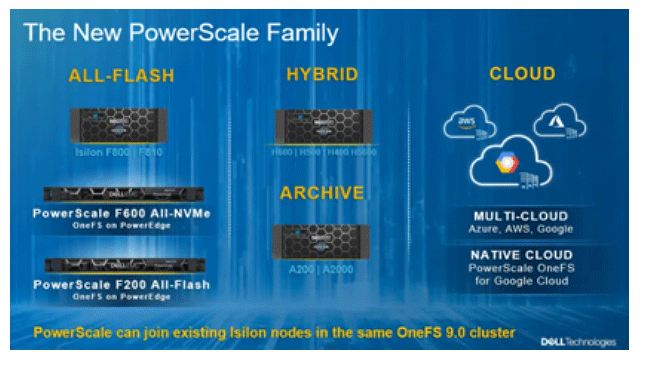Storage Engineer
Modern data centers are built around several innovative IT building blocks, such as flexibility, agility, automation, and security. What does that really involve from a technology standpoint? Examples include an updated network design using spine and leaf, containers, Kubernetes, Ansible, and cloud options.
In June of 2020, Dell EMC refreshed the wildly successful Isilon platform with more powerful hardware and a name change. The new moniker is Dell EMC PowerScale, which allows it to fit well into the rest of the Dell EMC Power lineup. You may recall that Isilon was King of the Hill when it came to file, object storage (ObS), and streaming data offerings. Appropriately, the new PowerScale provides these features and more!
Isilon’s shared-nothing architecture platform was rejuvenated to achieve several goals, one of which was bringing new operational simplicity and agility to enterprise customers with mixed data types. As you well know, PowerScale is built upon the highly scalable OneFS Operating System and can now scale out to 50 petabytes in a single file system. That means Dell EMC has placed the number-one scale-out NAS solution (OneFS) onto the number-one server platform (PowerEdge).

Key points about Dell EMC PowerScale systems
- 1U node F200 can deliver up to 5x the performance of older models in a smaller, more efficient footprint.
- Performance scaling up to 15.8MM IOPS per cluster allows you to handle analytics, AI, IoT, and other demanding workloads.
- PowerScale OneFS 9.0 has multiprotocol support and leverages a new tool called Dell EMC DataIQ.
- OneFS supports NFS v3, NFS v4, and SMB access protocols.
- PowerScale clusters can scale from 11TB raw capacity to 50PB.
- Nodes are designed to be added to PowerScale or existing Isilon clusters in a minute. Talk about easy scaling across all your data center, edge, or cloud requirements!

Additional points about PowerScale systems:
- Includes S3 object access and support for Kubernetes (K8s).
- A robust REST API which utilizes HTTP to provide simple management.
- Programmable infrastructure with container frameworks.
- PowerScale includes automation tools to distribute resources and flexible failover policies for better data storage utilization. (For all you IT automation fans, fret not! There is an Ansible module for PowerScale. Mainline helps lots of customers with IT automation via Ansible, so if you need assistance please ask us.)
- Always-on deduplication and compression provide a guaranteed 4:1 data reduction rate.
- Storage management is simplified with seamless data protection and recovery.
- Cloud Storage Integration (CSI) via V1.1 which allows container storage connectivity, allowing them to be backed and hence restored.
- The recent release of PowerScale OneFS V9.1 has been optimized for maximum performance.
Dell EMC PowerScale Models
The PowerScale family currently offers several different models to select from. There are all-flash models for high-performance needs, some that exploit NVMe technology for perhaps edge or analytic workloads, and hybrid and archive models that support data management for less frequently accessed data that you might need to keep for monetization. In addition, there are the PowerScale cloud offerings, which include lots of different clouds and even on-prem clouds.

Manage the Growth of Unstructured Data
If your enterprise is experiencing uncontrolled growth of unstructured data, know you are not alone! Industry experts project unstructured data to triple by 2024. How is your enterprise going to tackle that uncontrolled data growth issue today and beyond? Some of Mainline’s largest customers, including those in healthcare and media and entertainment, are currently running Isilon for their large workloads. They are planning their projects to move forward to the new PowerScale offerings to assist them in modernizing their application workloads.
Native PowerScale Cloud features support your day-to-day operations teams with tools to assist your storage environment. One such tool is Dell EMC DataIQ, which provides a unified file system view of PowerScale, ECS, third-party platforms, and the cloud. As a result, DataIQ delivers unique insights into data usage and storage system health.
Another beneficial feature to leverage is CloudPools, which provide policy-based automated tiering, allowing your enterprise to keep the hot data where it belongs on the primary storage and the less-needed data on less-expensive offerings. CloudPools are currently available for Amazon AWS, Google GCP, Microsoft Azure, Dell EMC ECS, or Federal C2S clouds. Additionally, the native S3 access allows you to seamlessly move data around as needed without having to change data formats, saving valuable time in today’s fast-paced business environment. Explore how CloudPools could help you with your disaster recovery and business continuity requirements and testing. We have several customers augmenting the testing of their DR plans more frequently using CloudPools.

Dell EMC PowerScale is a true industry leader, celebrating its fifth straight year in the Gartner Magic Quadrant for Distributed File Systems and Object Storage. If you are looking for a best-of-breed system of truth for your modern data center that supports block, file, and object storage, look no further than Dell EMC PowerScale to modernize your data center storage offerings and free up admin time to focus on new business needs and driving business growth.
More Information
Mainline is an award-winning, Titanium Dell Technologies partner, the highest partnership level in the Dell Technologies Partner Program. Our certified team of engineers and architects has deep industry expertise and helps our customers select and architect the best technology for their business continuity needs. For more information, please contact your Mainline Account Executive directly or contact us here.
Related Articles
Learn About our Partnership with Dell Technologies
BLOG: What makes Powerstore’s new metro node feature so compelling?

